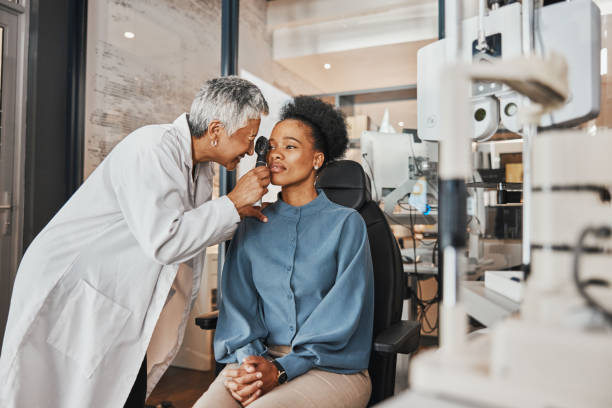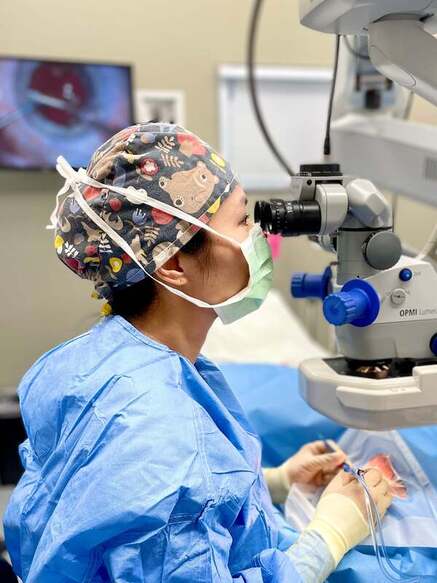The Relevance of Regular Eye Tests: Insights From an Experienced Ophthalmologist
Regular eye tests function as an essential part of healthcare that extends past simple vision adjustment. An experienced ophthalmologist can supply insights into exactly how these analyses not only spot common eye conditions however likewise disclose underlying health and wellness issues that may or else go unnoticed. The silent development of illness such as glaucoma and macular deterioration highlights the requirement of early detection. Recognizing the frequency and significance of these analyses can eventually influence one's long-term health and wellness trajectory, raising the question of just how usually individuals must prioritize their eye wellness in the context of general wellness.
Benefits of Normal Eye Exams
Although many people may neglect the relevance of regular eye exams, these analyses play a critical function in maintaining overall health and wellness and health. Normal eye evaluations offer not only to examine vision but also to identify early signs of systemic wellness problems, including diabetic issues and high blood pressure. By identifying these conditions at their creation, people can receive prompt treatments, significantly enhancing lasting results.
Furthermore, eye tests can aid in keeping an eye on existing health and wellness problems, guaranteeing that any type of modifications in vision or eye wellness are promptly addressed (optometrist). The assessments permit for tailored referrals concerning glasses, way of living modifications, and safety steps against possible eye stress or damages
Beyond physical health and wellness, the benefits of normal eye examinations encompass boosting lifestyle. Improved vision helps with far better performance in everyday activities, from checking out to driving, therefore contributing to greater self-reliance and safety. Inevitably, focusing on eye exams fosters a positive strategy to health monitoring, encouraging individuals to take fee of their health. Regular exams are a necessary element of a detailed medical care approach, guaranteeing that both vision and total health and wellness are maintained throughout life.
Common Eye Issues Detected
Regular eye tests contribute in detecting a variety of typical eye problems that can substantially impact vision and total wellness. Among the most widespread conditions recognized during these exams are refractive mistakes, including myopia (nearsightedness), hyperopia (farsightedness), and astigmatism. These conditions typically materialize as blurred vision and can be quickly fixed with prescription glasses or get in touch with lenses.
Furthermore, cataracts, which create clouding of the lens, are often diagnosed in older grownups. This problem can bring about decreased vision and requires medical treatment for resolution. Another typical concern is glaucoma, a group of eye diseases that damage the optic nerve, typically linked to enhanced intraocular pressure. Early discovery is vital as it can protect against irreversible vision loss.
Age-related macular degeneration (AMD) is another significant condition that impacts main vision, especially in people over 50. Lastly, diabetic retinopathy, a complication of diabetes, can bring about extreme vision problems if not kept track of consistently. Via comprehensive eye exams, these conditions can be recognized early, enabling prompt monitoring and therapy to protect vision and enhance lifestyle.
Value of Very Early Discovery
Early discovery of eye problems plays an essential function in review preserving vision and protecting against considerable health and wellness complications. Several eye conditions, such as glaucoma, diabetic retinopathy, and age-related macular degeneration, can advance calmly without visible signs and symptoms in their very early stages. By the time signs and symptoms materialize, irreversible damages might have happened, bring about long-term vision loss.
Normal eye examinations assist in very early diagnosis, permitting timely treatment and treatment. As an example, dealing with raised intraocular stress can stop the onset of glaucoma, while managing blood sugar degrees can considerably decrease the danger of diabetic person retinopathy. Additionally, conditions like cataracts can be successfully handled with surgical treatment when identified early.

How Usually Should You See?
Identifying the frequency of eye tests is important for maintaining ideal eye wellness and vision. The basic recommendation for grownups is to have an extensive eye exam every one to 2 years, depending on individual danger elements and age.
People with particular risk variables, such as a household background of eye illness, diabetic issues, or existing vision issues, might need more constant assessments. Youngsters must have their first eye exam at 6 months of age, adhered to by extra exams at age three and prior to getting in school. Regular examinations during youth are important as vision can change rapidly throughout developing years.
Ultimately, the frequency of sees need to be tailored to each person's circumstances, consisting of lifestyle, occupational dangers, and any type of pre-existing eye conditions. Consulting with an eye care expert can give individualized Visit Your URL recommendations, making sure that your eye wellness is consistently kept track of and preserved.
Tips for Your Eye Examination
Preparing for your eye exam can enhance the performance of the check out and make certain a detailed analysis of your eye wellness. To maximize your time with the eye doctor, it is essential to gather relevant information before your consultation. Begin by putting together a list of any type of medications you are presently taking, including over-the-counter medications and supplements, as these can impact eye health and wellness.
Additionally, document any kind of symptoms you have experienced, such as obscured vision, pain, or headaches. This information will certainly help your optometrist in identifying prospective concerns. If you use glasses or call lenses, bring them along, also if you do not wear them frequently. This will assist the doctor assess any kind of adjustments in your vision. my blog
It is also useful to have a household background of eye conditions available, as genetic variables can add to your eye health and wellness. Finally, take into consideration scheduling your exam for a while when you are less rushed, permitting you to ask concerns and discuss your problems thoroughly. By preparing appropriately, you make certain that your eye test is productive which your eye doctor has all the necessary information to supply the very best care feasible.

Final Thought
Normal eye exams play a vital duty in preserving both vision and general health and wellness. They promote the early detection of different eye problems and systemic problems, allowing for timely intervention. The referrals for frequency highlight the value of aggressive treatment. Applying straightforward primary ideas can enhance the evaluation experience. Ultimately, prioritizing thorough eye analyses contributes significantly to the conservation of vision and the renovation of lifestyle, highlighting the necessity of regular eye treatment in precautionary health care techniques.
Normal eye tests are critical in finding a range of usual eye problems that can considerably affect vision and general health.Establishing the regularity of eye examinations is important for keeping optimal eye health and wellness and vision.Preparing for your eye test can enhance the efficiency of the go to and guarantee a comprehensive evaluation of your eye health and wellness (optometrist). By preparing sufficiently, you ensure that your eye test is productive and that your eye doctor has all the needed info to supply the ideal treatment possible
Eventually, prioritizing detailed eye evaluations adds dramatically to the conservation of vision and the improvement of high quality of life, underlining the necessity of routine eye care in preventative health care strategies.